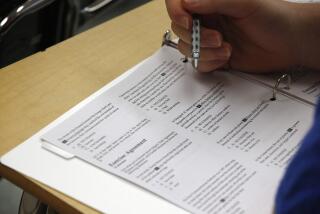Frazzled, Fretting and Freaking Out Over SAT Scores
- Share via
“If I don’t get over a 1,200 on the SAT, I’m going to kill myself,” said Chris, a high school student whom I was tutoring earlier this year. He was kind of kidding, but kind of not, and it’s never a good idea to ignore it when a 17-year-old says he’s thinking about suicide. Even if he wasn’t serious, the idea that one test was making life so miserable that a bright young man would start to talk like that infuriated me.
So I shut the books and asked Chris what the problem was. His reasoning went like this: If he didn’t get at least a 1,200 on the SAT, then his top-choice school wouldn’t accept him, he wouldn’t get to study the particular kind of music he wanted to study, he wouldn’t get a good job when he graduated and he would be miserable forever.
What’s amazing is just how pervasive this SAT mania has become. The next day I asked my students at UCLA about their experiences with SAT preparation. Their stories left me flabbergasted.
Many of them began their training as early as seventh grade, when their middle schools started administering practice SAT exams. One student started going to classes at an SAT prep center twice a week after school. And the parents of another sent her brother to SAT summer “boot camp” when he was only 14. Every day, from 8 a.m. to 5 p.m., he was drilled on SAT questions when other kids were playing sports or reading a book.
More of my students raised their hands to share college prep suffering: older sisters forcing younger sisters to learn trigonometry in fourth grade; parents forcing their middle school children to do problem sets from high school textbooks; handfuls of hair coming out in the shower because of the stress of the application process.
What a waste! Instead of reading books, these kids were memorizing vocabulary lists. Instead of exploring ideas, they were practicing inane math problems of the “if two trains leave the station at the same time, one traveling at 30 mph and the other ... “ variety.
They were fretting, frazzled and freaking out. All this agonized suffering was because they believed they had to get into the “best” colleges so that the doors of the future would be open to them. But nothing guarantees that kind of success. The truth is that the “best” schools may not be the best for everyone. The annual rankings of colleges in publications like U.S. News & World Report are based on things like which colleges have the highest endowments and the most famous professors. But just because a professor won the Nobel Prize doesn’t mean he or she has a clue about how to teach.
I regularly hear from transfer students at UCLA that their community college professors were more involved and enthusiastic about their work. I don’t mean to denigrate university faculty, most of whom are excellent, but the idea that a college with a “better” reputation offers a “better” education is absurd.
My top choice for college was Williams, a prestigious school of 2,000 students in Massachusetts. Virtually everyone there loves it -- the school graduates about 96% of entering freshman -- but I hated it. So I spent a year at the less-renowned University of East Anglia in England, which I loved, and decided to transfer there.
The point is that at 18 you rarely know what’s going to make you happy, and you don’t want to get caught in the trap of thinking that only one school, or only one kind of school, is for you. College students change majors, friends, lifestyles, romantic partners, hobbies and political beliefs on a regular basis. This is normal. So we shouldn’t be surprised when what they think is going to be perfect turns out to be rotten, or vice versa.
The SAT, then, is not the make-or-break moment for you or your teenager, because no single college offers the “perfect” experience. Students have the power to shape and change their experiences to create their own ideal, whether the college they find themselves in is or is not their first choice.
As a college educator, I’d much rather have pre-college students reading a book or even getting some exercise than studying obsessively for the SAT or losing hair over college application stress.
*
Greg Rubinson is a lecturer in the UCLA Writing Programs.






